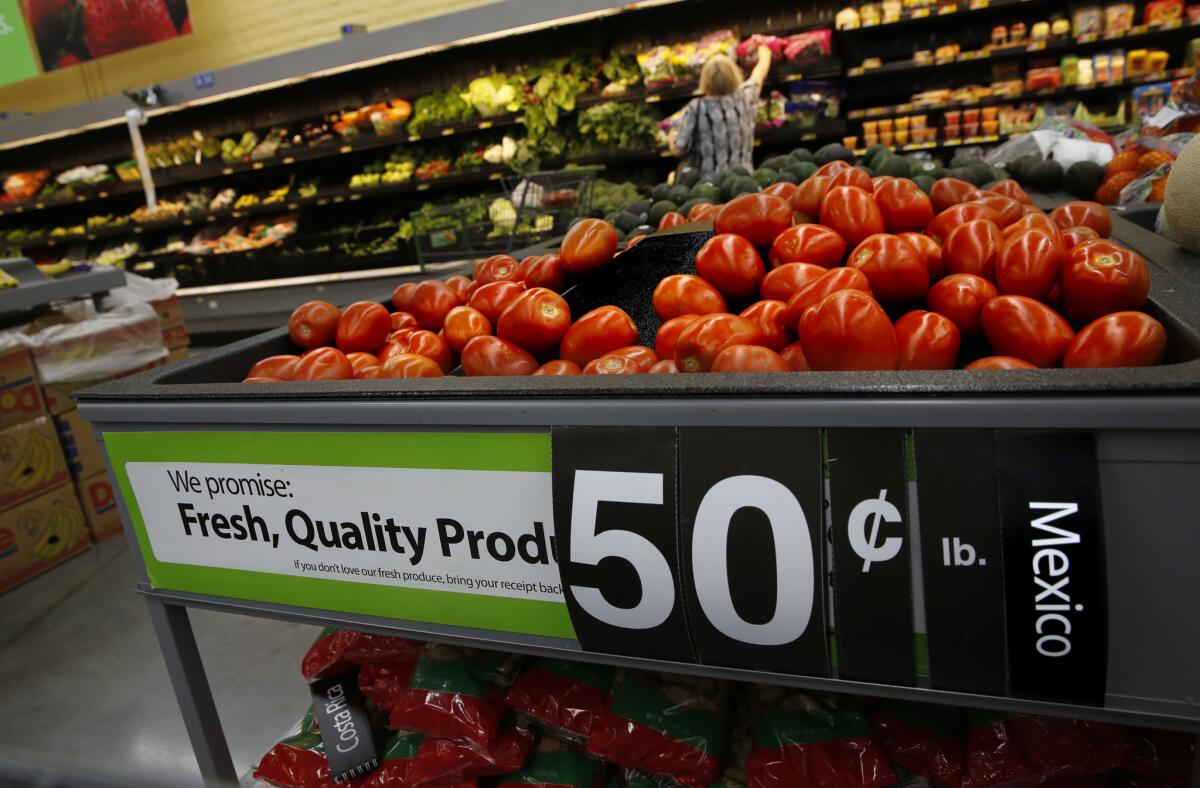Stop Blood Tomatoes Act meant to curb Mexico labor abuses, lawmaker says

Roma tomatoes from Mexico for sale by Walmart in San Marcos, Calif.
- Share via
A California congressman on Friday introduced a bill to ensure U.S. retailers rid their supply chains of child and forced labor — legislation inspired by The Times’ Product of Mexico series, which documented widespread abuses at export farms south of the border.
The Stop Blood Tomatoes Act, sponsored by Rep. Juan Vargas (D-San Diego), seeks to bring more oversight to the Mexican farms that supply much of the nation’s fruits and vegetables.
Under the proposal, large companies would have to get independent audits of their suppliers to certify that they do not use child or forced labor. The legislation would apply to companies in other industries that also import large quantities of goods from developing countries.
Vargas, the son of a migrant farmworker from Mexico, said the bill reflected consumers’ growing interest in knowing more about the goods they buy. Companies, he said, should be held accountable for abusive labor practices in their supply chains.
“To shame some of the companies to do the right thing. That’s what I’m trying to do with this bill,” Vargas said.
Many Mexican farmworkers, The Times found, live in overcrowded camps that lack water and are overrun with rodents. Employers often withhold wages and prevent people from leaving without paying debts workers incur at overpriced company stores.
Although child labor has been mostly eliminated at big farms, the practice persists at some smaller ones that export produce to the U.S.
The series’ revelations were upsetting, Vargas said. “It was hard to read those articles.... You can’t read that and not want to act,” Vargas said. “This is wrong. You have to change it. Nobody wants to eat blood tomatoes.”
Mexican agricultural exports to the U.S. have boomed in recent years, reaching $7.6 billion last year. Half the tomatoes consumed in the country now come from south of the border.
Large retailers like Wal-Mart and Safeway have ethical sourcing guidelines that prohibit abusive labor practices in their supply chains, but The Times found there often is little to no enforcement.
Under the proposed legislation, companies would be required to post the audit results on their websites. Such disclosure, Vargas said, would allow consumers to make informed choices.
Increased consumer awareness of labor abuses in the footwear, apparel and computer industries has led to improved working conditions in Asia. Vargas said his legislation, if passed, could have a similar effect on the produce industry.
“It doesn’t say that the government will come in one day and bust you,” he said. “It does say that if you don’t do the right thing, the world will bust you. Consumers will bust you. You will have reputational risk.”
The legislation is expected to meet resistance from industry groups, which generally have balked at adopting oversight measures that increase costs. But Vargas’ proposal could earn support from tomato-growing regions like Florida, where farmers long have complained that Mexican growers have an unfair trade advantage because of exploitative labor practices.
Groups that promote greater supply chain transparency expressed support.
“Consumers are increasingly aware that they are connected to forced labor issues through the products that they buy,” said Kilian Moote, project director for Know the Chain, a website that tracks corporate compliance with California anti-trafficking legislation.
His organization, Moote said, “is supportive generally of legislative efforts to increase consumers’ understanding of how they can purchase in an informed and responsible way.”
The produce industry on both sides of the border is taking more action to address worker welfare issues.
After The Times’ series was published, the Mexican government and industry groups formed a social responsibility alliance to improve the lives of more than 1 million Mexican farmworkers. Wal-Mart, the world’s largest retailer, also announced steps to beef up worker welfare requirements at its supplier farms.
Representatives for several industry trade groups, including the Fresh Produce Assn. of the Americas and the Food Marketing Institute, did not return calls seeking comment on Vargas’ proposal.
Twitter: @ricardin24
More to Read
Sign up for Essential California
The most important California stories and recommendations in your inbox every morning.
You may occasionally receive promotional content from the Los Angeles Times.














